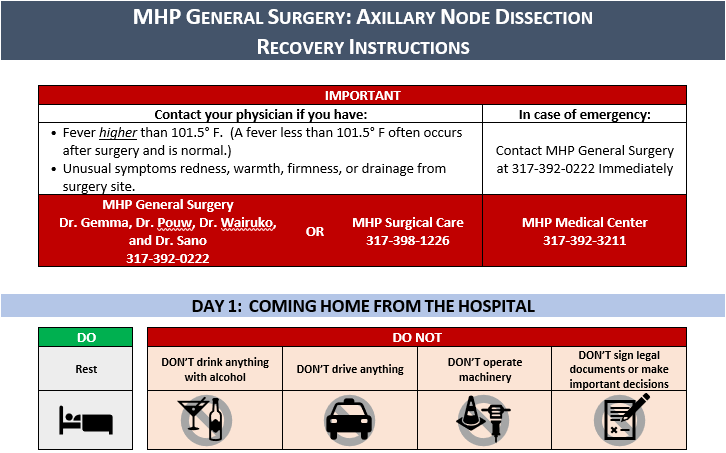
Medications:
- You can take all your medicines that you were taking before your procedure. Do NOT drink alcohol before, during, or after the surgery while taking pain medication.
- Also take the new medications you were given after your procedure. Be sure to follow the instructions for how to take your medicines. These instructions usually include what time of the day to take your medicines and whether to take them during a meal or on an empty stomach.
- For Pain: It is OK to take Tylenol (acetaminophen) or Advil (Ibuprofen) for mild pain. If this is not enough, you may take your prescribed pain medicine. DO NOT take Tylenol (acetaminophen) at the same time as taking your prescription pain medicine.
- For Constipation: Prescription pain medicines frequently cause constipation. This means it can be hard to use the restroom. You may take over-the-counter stool softeners to help prevent this problem.
- For Birth Control: Certain birth control products work by changing body chemicals called hormones. Some examples include Birth Control Pills, Skin Patches, Implants, and certain IUDs. The medicines you may have received while in the hospital can stop those birth control products from working. To avoid getting pregnant, use an additional birth control product that does not affect your hormones. Some examples include condoms and spermicides. Use these additional products for the next 31 days if you wish to avoid becoming pregnant.
Eating and Drinking:
- Resume usual diet as tolerated. Start with liquids first, if you aren’t nauseated, you may advance your diet. No alcoholic beverages today.
What to Expect During this Time:
- It is normal to have a slightly sore throat for a few days following your procedure. This should go away within 24-48 hours. You may use a throat lozenge or cough drop for temporary relief.
- Having surgery may cause temporary body aches, tiredness, nausea, and light-headedness. These should also go away within 24-48 hours after surgery.
- For your procedure, an IV was inserted into your arm or another part of your body. It is normal to see bruising where the IV was placed. If you have swelling or discomfort, a cold compress may be helpful. If you develop redness, warmth, or oozing where the IV was placed, please contact your physician.
- The medicines you received during your procedure may slow your ability to think and react. Do not drive anything, operate machinery, or sign important legal documents today.

What to Expect During this Time:
- Resume activity as tolerated.
- Bruising is normal.
- You may shower in 48 hours. Do NOT soak incision sites. If you would like to shower prior, please cover your incisions with a water proof dressing.
- Dressing change after 48 hours. If you have steri-strips, do not remove them. If they do not fall off on their own, they will be removed on your first follow-up appointment.
- Apply ice pack to the area of the incision for the first 24 hours for 20 minutes on and 20 minutes off for discomfort and swelling. Repeat as needed.
- Continue your Incentive Spirometry every 2 hours until you are up and moving around. Once you are up and moving, continue doing so 4 times a day until your follow up appointment. Be sure to do 8-10 breaths and take your time so you do not get dizzy.
- No blood pressure or blood draws from operative site unless directed otherwise.
- Your doctor’s office will also notify you of any test results from your procedure at your follow up appointment.
- A nurse will call you in the next few days to discuss your recovery and answer any questions you may have. If you have questions before our nurse calls, please contact your physician or call MHP Surgical Care (317-398-1226) to speak with one of our nurses. After hours, you may call the MHP Medical Center (317-392-3211).